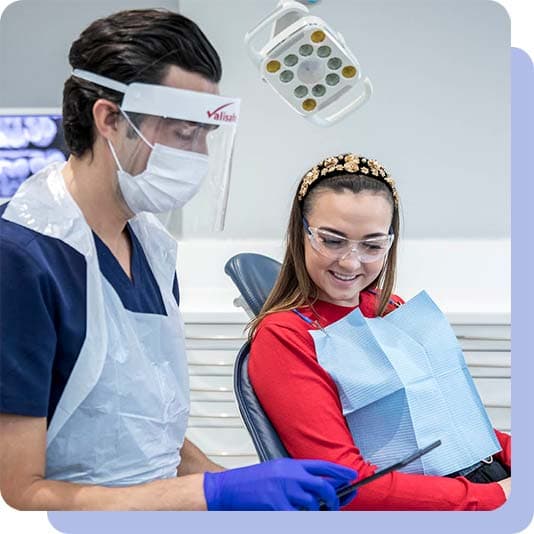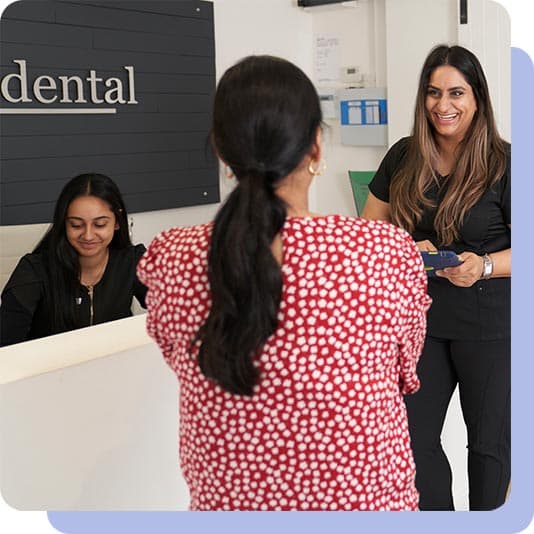A guide to dental health
Published on 21/9/2021
Reviewed on 25/9/2023 by Bryony Rhodes-Wort

Your questions about the dentist and your dental health, answered by our clinical team here at Simplyhealth.
What do we mean by 'dental'?
The term dental relates to everything to do with your teeth and mouth. Dental treatment addresses the health and maintenance of your teeth, gums, and overall oral health.
Differences between the dentist and hygienist
Do I need to visit the dentist?
When it comes to your health, prevention is always better than cure. And that is especially true for your oral health. Visiting the dentist regularly helps to keep your mouth healthy and can prevent dental problems from occurring.
You may feel like your teeth are perfectly fine, and you may have no pain or sensitivity. But that doesn't mean you don't need to see your dentist for a routine check-up. It's much better, and cheaper, to identify and rectify a problem before it escalates.

How much does the dentist cost in 2024?
It all depends on the treatment you need and the type of dentist you visit.
NHS dentistry is split into three bands:
Band 1 costs £25.80, which covers examinations, diagnosis, and advice. It can also include x-rays and scale and polish if required.
Band 2 costs £70.70. That includes all treatments in Band 1, as well as fillings, root canals, and extractions.
Band 3 costs £306.80. This is for more complex work, such as crowns, dentures and bridges.
NHS dentists also provide emergency treatment, which costs the same as Band 1.
If you visit a private dentist, your costs will be different. You can check prices on your dentist's website or get in touch with them to find out more. Before any work, always find out how much it will cost.

Claim back your dental costs today
Join Simplyhealth and you can get money back on your health treatments, including dental. Plans start from £23 a month.
What happens during a dental appointment?
Typically, during your appointment, your dentist will examine your teeth, gums and soft tissues. They will also check your neck and jaw area and take any radiographs (x-rays) if necessary.
They will discuss your general health, any changes in your medical history, lifestyle or problems since your last appointment. They can advise on your diet, smoking and alcohol use, as well as your brushing and flossing routines.
Your dentist will advise on how frequently you should come back and will recommend you to see a hygienist if it is deemed necessary.
How often should I have a dental check-up?
Every two years? No, wait, every six months? The truth is, it's different for everyone. Many assume you should visit the dentist for a check-up roughly every six months. But in reality, how often you need to visit the dentist varies from person to person.
We all know someone who hasn’t seen the dentist in years and ‘got away with it', then, on the other hand, we know a person who’s always needing dental work done.
It's all based on individual recommendations. After each visit, your dentist will let you know when you should come for your next check-up. They’ll base this on an analysis of your oral health and future risk of problems. On average, the time between dental check-ups can range from three to 24 months This may change over time as your oral health improves or declines with age.
Related articles and guides

Your guide to the online GP
Everything you need to know about having a doctor's appointment through video call.
Health treatment guides
Learn about other treatments and services that can support your health and wellbeing, like physiotherapy, online GP services, and podiatry.

10 ways to look after your teeth
Find out what clinical experts say we can do in our day-to-day lives to help protect and improve the health of our smiles.
This material may contain links to other websites operated by third parties. It is the responsibility of third parties to ensure such material and websites comply with all relevant laws and regulations. To the maximum extent permissible by law Simplyhealth disclaims all responsibility for such websites.
